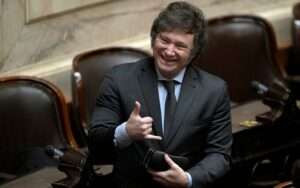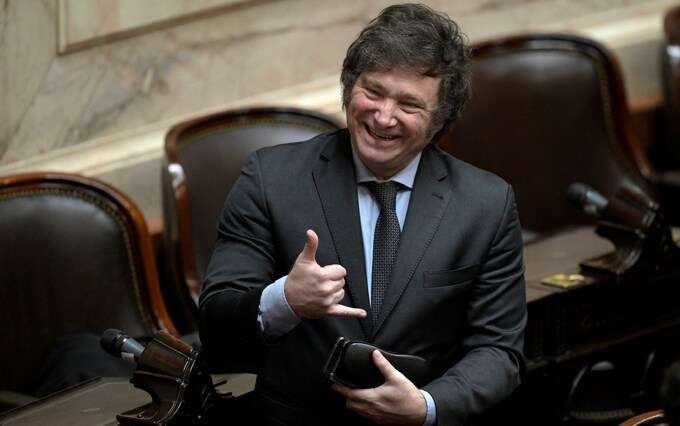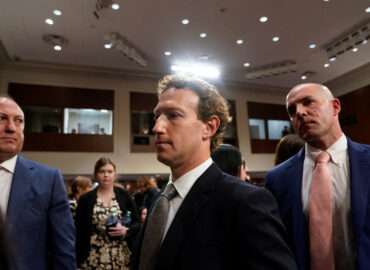From Theory to Reality: Assessing the Viability of Javier Milei’s Economic Philosophy

Last week, Argentina officially declared its decision not to become a member of the BRICS bloc of emerging economies. This marks a significant change in foreign and economic policy under the leadership of Argentina’s recently elected far-right populist President, Javier Milei. Argentina confronts its most severe economic crisis in two decades, marked by triple-digit inflation and over 40 percent of the population residing below the poverty threshold. Economist Milei centered his campaign on radical ideas such as abolishing the central bank, shuttering critical ministries, and advocating for the dollarization of the Argentine economy. Additionally, he has adopted positions opposing abortion rights and has characterized climate change as a “socialist lie.”
Within the initial 20 days of assuming office, the far-right political figure issued a decree altering or nullifying over 300 laws without discussion, enforced a protocol against protests, and submitted a bill to Congress seeking an extension of Executive powers.In addition to other measures, it revokes laws, abolishes numerous state regulations, facilitates the privatization of public enterprises, paves the way for dollarization, and approves making the labor market and health system more adaptable. This choice faces scrutiny in Congress, the judiciary, and among the public on the streets, with many labeling the decree as “unconstitutional.”
This authoritarian shift, coupled with the radical nature of these measures, is starting to impact the president adversely. The social atmosphere is charged, with unions declaring a strike scheduled for the end of January.
Milei has consistently advocated for radical strategies to rejuvenate Argentina’s struggling economy. His campaign focused on proposals such as dismantling the country’s Central Bank and adopting the US dollar as the official currency to address the issue of soaring inflation.
Nevertheless, skeptics argue that Milei’s ability to implement his ambitious domestic agenda may be limited due to his party’s relatively modest representation in the National Congress. However, in the realm of foreign policy, Milei is anticipated to wield more influence.
How is the IMF recieving Milei?
Milei’s proposals received applause from the International Monetary Fund (IMF), whose $44 billion loan program prevented Argentina from collapsing, deeming them “bold initial actions” following recent setbacks.
The IMF has committed to working swiftly to restore Argentina to a positive trajectory, providing reassurance to Milei, especially as the country faces an impending payment of nearly $2 billion to the fund in January.
Jeff Grills, the head of emerging markets debt at Aegon Asset Management, remarked that the new government has taken commendable measures thus far, expressing satisfaction with their approach and the signals they are sending.
Why the likes of Jeff Grills endorse Milei’s action?
Jeff Grills represents the opinion of the financial elite that almost always creates there wealth via different modes of financialisation,which has no ‘real’ output generated or manufacturing.
While Javier Milei’s economic and political positions might attract support from certain quarters, it’s essential to critically examine the reasons financial elites might align with him. Milei’s pro-market stance and advocacy for free-market policies could be viewed through a skeptical lens, as these positions often prioritize the interests of the wealthy at the expense of socioeconomic equality. The reduction of government intervention, which financial elites might find appealing, could raise concerns about insufficient regulatory oversight, potentially leading to unchecked corporate power and increased income inequality.
Milei’s emphasis on fiscal responsibility may be seen as advantageous to financial elites, but critics argue that such policies could disproportionately burden the less affluent through cuts in essential public services and social programs. This could exacerbate existing social disparities, potentially benefiting the financial elite at the cost of the broader population.
Similarly, the commitment to sound monetary policy, while appealing to financial elites engaged in international trade and finance, may be seen as prioritizing the stability of financial markets over the welfare of ordinary citizens. Policies that focus excessively on monetary concerns can sometimes neglect the broader socioeconomic impact on the majority.
In conclusion, while financial elites might appreciate certain aspects of Javier Milei’s economic and political positions, a critical perspective raises questions about the potential consequences of policies that primarily serve the interests of the affluent. It is crucial to scrutinize how these positions may contribute to existing inequalities and whether they prioritize the broader welfare of society.
Will Milei-conomics work?
Milei’s suggestions to address the economic challenges in Argentina lack uniqueness and practicality. Dollarization, privatization of state functions, and suppressing workers’ organizations are rooted in the neoliberal austerity agenda that has affected the world for decades. Engaging in debates about Milei’s specific policies overlooks the broader issue behind the global rise of the far right. The appeal of figures like Milei, Bolsonaro, Modi, and Trump lies not in their proposed solutions but in their bold style. They promise to confront and shake up institutions, creating a sense of excitement that masquerades as a forward-looking plan.
In the past, the international middle-class prioritized convenience, despising inconveniences like traffic jams and limited choices for schools and consumption. However, when the entire system faces challenges, assurances of stability become ineffective. The political center, including Milei’s opponents, often speaks of stability while the country faces crises, offering little more than incremental destruction. In this context, timidity is unattractive to the middle class and the working class, who seek bold visions rather than a focus on mild improvements alongside corporate tax breaks.
This timidity is not solely about the character of the political force seizing the moment; it reflects the diminishing boldness of the center-left and its platform. The immense stresses on society, such as job insecurity, the state’s withdrawal from social care, privatization of leisure, and individualized education, have led to overwhelming social problems. The political horizon of the center-left has narrowed to managing a decaying civilization, further alienating the public. Two generations raised in the austerity era have been sold false promises by technocrats advocating neoliberal growth, making it challenging for experts to caution against far-right economic approaches.
Neoliberalism has not only increased global precariousness but also fostered sentiments of anti-intellectualism and anti-democratization. The erosion of education systems and the reduction of mass media to a gladiatorial contest hinder serious public discussions. Milei’s success is a symptom of a broader social process, not confined to Argentina but prevalent worldwide.
The pillars of neoliberalism, like privatization and commodification of state functions, have given rise to corruption and crime. Deregulating private enterprise and privatizing state functions deepen the connection between the political and capitalist classes, creating opportunities for corruption through state contracts, reduced regulations, and illicit financial transactions.
Javier Millei






